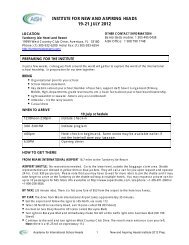AISHnet Survey - Academy for International School Heads
AISHnet Survey - Academy for International School Heads
AISHnet Survey - Academy for International School Heads
Create successful ePaper yourself
Turn your PDF publications into a flip-book with our unique Google optimized e-Paper software.
Do Your Homework<br />
Bambi Betts<br />
October 2010<br />
If there is anything about the place called school that can evoke a strong emotion from just about everyone, its<br />
homework. Should we, shouldn’t we? If so, when, how much, what kind? Should we assess it? Should it ‘count’?<br />
Dozens of research studies have revealed just about every conclusion we can think of. It has become an equity<br />
policy, a <strong>for</strong>m of punishment, a weapon, a major tool (often the only one) <strong>for</strong> ‘teaching’ independent learning, the<br />
subject of hours of debate at faculty and parent meetings.<br />
Homework, at its core, is a concept - the notion of continuing the learning begun at school beyond the <strong>for</strong>mal<br />
school day. It is not a separate, stand-alone practice, rather one of the strategies in the repertoire of instructional<br />
methods, ideally completely aligned with the learning principles and practices at the school. Homework is simply a<br />
tool we use to extend learning <strong>for</strong> those who may benefit from it when kids are outside of the care of the school.<br />
All our practices at school, including homework, are driven by an underlying ‘philosophy’ – which hopefully by now<br />
is described as a set of learning principles or axioms rather than a set of beliefs (Don’t know many successful<br />
organizations which are built on just beliefs and faith)<br />
The learning principles that would mostly likely be the drivers <strong>for</strong> any homework policy would be:<br />
• Durable learning requires some independent, unguided learning opportunities.<br />
• All learners learn differently and at different paces.<br />
• The more we practice something the better we are likely to understand it or do it.<br />
• Feedback is an essential ingredient <strong>for</strong> learning.<br />
Un<strong>for</strong>tunately the homework practices in some schools seem to be based more on premises like these: (which are<br />
not particularly about learning)<br />
• Everyone must do homework (and frequently the same work or same amount)because everyone else<br />
does (the equity assumption)<br />
• We have to give the kids homework because the parents expect it.(the parents rule assumption)<br />
• Kids have to learn to work on their own (…starting at 5 years old)<br />
• Kids must have some consequence <strong>for</strong> not doing it. (it's not about learning, just doing it)<br />
• Turning homework in is the biggest single indicator that a learner is becoming independent and<br />
responsible. (<strong>for</strong> the record - turning or not turning in homework accounts <strong>for</strong> 10-50% of how students<br />
are ultimately ‘graded’)<br />
• It’s OK <strong>for</strong> a kid to practice a skill the wrong way as long as he does the work.<br />
Be<strong>for</strong>e we even consider what homework should actually look like, let’s remind ourselves that it is not an isolated<br />
activity. Effective homework relies on two essential classroom practices:<br />
1. Making it clear and explicit to learners WHAT we intend them to learn. If in fact we are meant to be<br />
learning something EVERYDAY at school then it should not be too difficult to make this clear to learners.<br />
We are becoming quite skilled, even with younger children, at this excellent practice of stating the<br />
learning goal, framing it as a question – being CLEAR about what we can expect to learn.<br />
2. Engaging kids in authentic tasks – embedding the learning in contexts in which that learning actually<br />
‘lives’. If schoolwork is disconnected, decontextualized and non-authentic, then so will homework be - a<br />
true crime.



